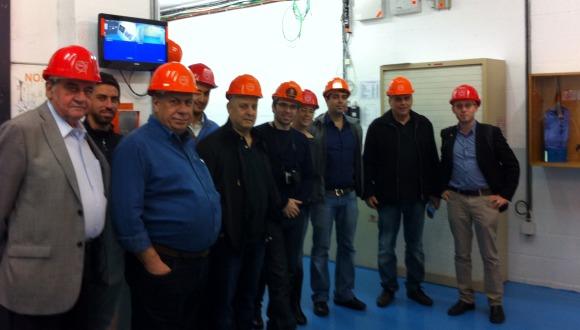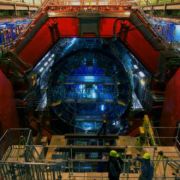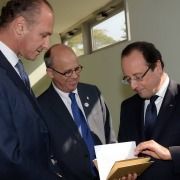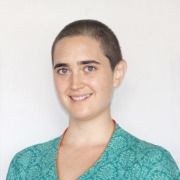Second TAU-Led Tour to CERN a Resounding Success
A guided tour of the world’s largest physics lab
Hot on the heels of the successful inaugural visit earlier this year, TAU led a second VIP access tour of CERN, the European Organization for Nuclear Research.
The exclusive, three-day trip would not have been possible without the close, longstanding ties developed over the years between TAU physicists working at the facility and their CERN counterparts. Indeed, a key emphasis during the tour was the important contribution of Israel, and particularly Tel Aviv University, to the research being conducted at CERN and in the broader global scientific arena.
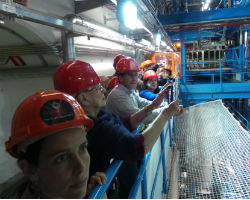 The 24 strong group comprised TAU Friends, supporters, scientists and high ranking officials, among them President Joseph Klafter, Vice President of Development Amos Elad and members of the TAU CERN team: Profs. Yaron Oz, Erez Etzion and Halina Abramowicz. As participants toured the complex scientific machinery at the complex, they were given explanations and unique insights by some of CERN’s leading scientists, among them: Prof. John Ellis, a CERN veteran who has been researching at the institution since its establishment; and Dr. Lucie Linssen, CERN project leader and spokesperson of the CLIC Physics and Detector Collaboration.
The 24 strong group comprised TAU Friends, supporters, scientists and high ranking officials, among them President Joseph Klafter, Vice President of Development Amos Elad and members of the TAU CERN team: Profs. Yaron Oz, Erez Etzion and Halina Abramowicz. As participants toured the complex scientific machinery at the complex, they were given explanations and unique insights by some of CERN’s leading scientists, among them: Prof. John Ellis, a CERN veteran who has been researching at the institution since its establishment; and Dr. Lucie Linssen, CERN project leader and spokesperson of the CLIC Physics and Detector Collaboration.
The tour will help support some of TAU’s 2,300 PhD students in the sciences, humanities and the arts through the dedicated CERN Doctoral Fellowship Fund.
Scientific show and tell
The picturesque Hotel D’Angleterre was the backdrop for a half-day seminar led by the TAU CERN team, who seamlessly blended topics of hard science with questions of philosophy, society, humanity and the universe at large – and in a language that all participants could understand.
These stimulating presentations provoked vibrant group discussions not only about CERN, but also about research, teaching programs and daily life on the TAU campus. Participants were encouraged to join in and tell their respective “stories” to the group.
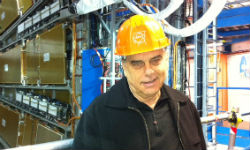 Participant Avram Grant (pictured) drew on his many years’ experience as a football manager to speak on how to instill passion with a group of diverse individuals and lead them to victory. His story perfectly reflected the history of CERN, which has united 4,000 permanent employees with 10,000 visiting scientists and engineers from 608 research facilities in 113 countries around the world in a common quest for knowledge.
Participant Avram Grant (pictured) drew on his many years’ experience as a football manager to speak on how to instill passion with a group of diverse individuals and lead them to victory. His story perfectly reflected the history of CERN, which has united 4,000 permanent employees with 10,000 visiting scientists and engineers from 608 research facilities in 113 countries around the world in a common quest for knowledge.
Another participant, Meryl Gallatin, commended TAU’s CERN team on its scientific excellence and connected their success to science enrichment activities for youth run by TAU, such as those at the Dov Lautman Unit for Science Oriented youth, which she said “are grooming Israel’s next generation of scientists.“
During the weekend-long Geneva visit, the group enjoyed a tour of the Martin Bodmer Foundation, one of the world’s largest private libraries; and Shabbat dinner with longstanding TAU friends Eliane and Philippe Meyer, who generously opened their home to the delegation and to special guest Eviatar Manor, Israel’s UN Ambassador in Geneva and the country’s chief representative to CERN.
Israel: Increasing recognition as a scientific powerhouse
Established in 1954 in Geneva, Switzerland, CERN is an international organization dedicated to operating the world's largest particle accelerator. It is home to one of the most complex experimental facilities ever built, the Large Hadron Collider (LHC), where the Higgs boson or “God particle” was recently discovered. The LHC was constructed in collaboration with 10,000 scientists and engineers from over 100 countries, in a tunnel 27 kilometers (17 miles) in circumference and 175 meters (574 feet) below the Swiss-French border.
The TAU tour took place barely a month before the momentous vote that could ratify Israel as the first non-European member of CERN. Israel will need a unanimous vote to achieve the coveted membership status, which could be highly lucrative. In return for a 13-14 million Swiss franc annual contribution, it would enable more Israeli scientists to join CERN’s staff, Israeli companies would be able to compete for contracts to build and maintain CERN facilities, and Israel would have a role in shaping research directions at CERN in the coming decades.


